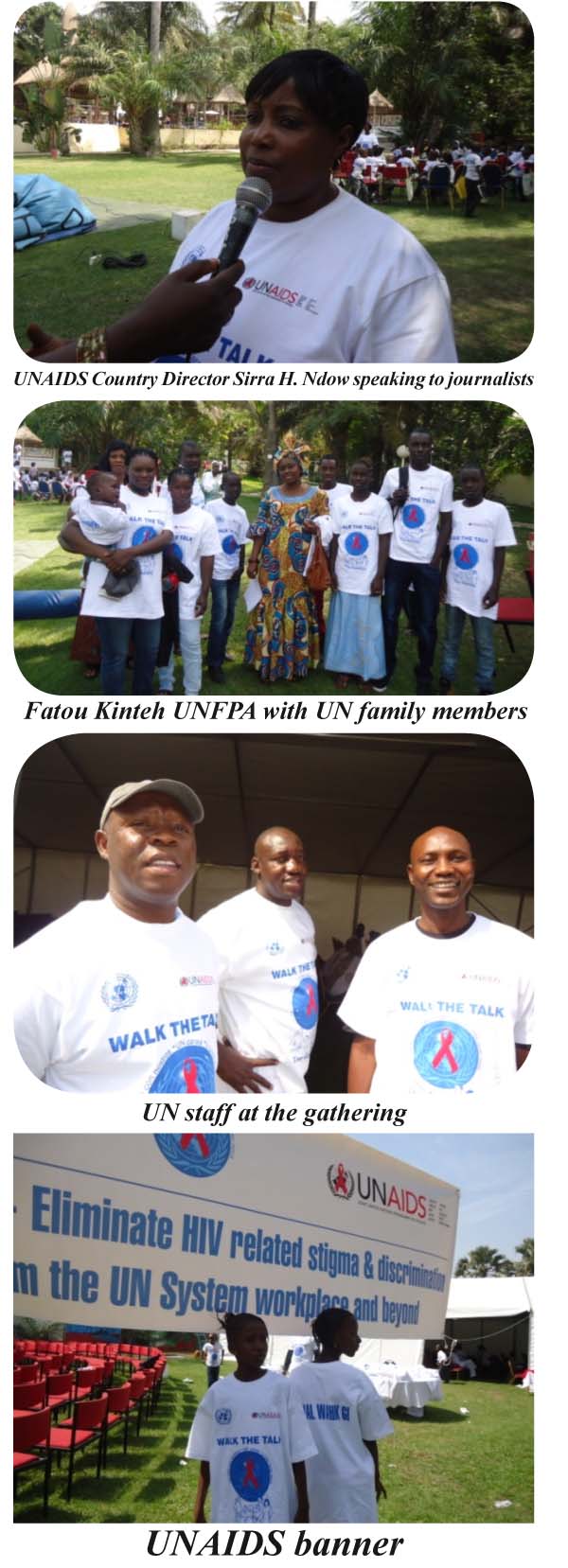
The event brought together UN staff and their families, representatives of the Gambia Network of Aids Support Society, GAMNASS, National Aids Secretariat, and the media.
In her statement, the UNAIDS Country Director, Ms Sirra Horeja Ndow, said the event was very pertinent and valuable for UN staff and their families.
According to the UNAIDS Country Director, ending the Aids epidemic by 2030 is possible, but only by closing the gap between people who have access to HIV prevention, treatment, care and support services and people who are left behind.
She stated that closing the gap means empowering and enabling all people everywhere, including UN personnel and families wherever they are, to know and have access to HIV services.
Ms Ndow added that UN Cares is the UN-wide workplace programme on HIV/AIDS designed for all UN personnel and their families to have access to prevention, treatment, care and support services.
The UN Cares programme in The Gambia involves the conduct of various activities, including UN Cares Family Day, lunchtime seminars for different staff categories, learning and training sessions on different topics such as STIs HIV/AIDS, prevention, care and support, stigma and discrimination campaigns.
The topics also include the distribution of both male and female condoms, the availability of PEP starter kits in our workplaces, voluntary counselling and testing services and a workplace free of stigma and discrimination.
“The day is an opportunity to renew our commitment, leadership and to practice what we preach and close the prevention, treatment and stigma and discrimination gap in the UN for personnel, their families and communities,” she said.
According to Ms Ndow, as part of UN Cares programmes, the UN System annually conducts UN Cares Family Day.
“We are gathered to share knowledge, information and resources with staff, families and communities in a highly interactive, educative and relaxing environment,” she stated.
“We are indeed honoured by the tremendous commitment and leadership demonstrated by UNCT to ensure the successful implementation of 2015 UN Cares Family Day and designating staff members to the UN Cares Committee,” Ms Ndow added.
“We are indeed pleased and honoured to inform you that the UN Cares team submitted an application under the 2014 Cares Award under the category reaching children and adolescents,” she stated.
“We are one of two honouree countries; in addition, the UN Clinic received recognition from the UN Medical Services for its commitment and contribution towards the successful implementation of UN Cares,” she further announced.
All these, she added, demonstrated that their efforts have been highly recognized, and also demonstrated clearly the UN System in The Gambia’s commitment and efforts to the HIV response and the successes achieved in the implementation of UN Cares programmes.
Ms Perpetua Katepa-kalal, FAO country representative, stated that World Aids Day is commemorated around the world on 1 December, and serves to remind them all of the many achievements that have been made in combating the disease, but also to remind them of the need to remain vigilant.
She added they still have a long way to go in achieving their goals of Zero New Infections, Zero Discrimination and Zero Aids-related Deaths, and that complementary to this, they in The Gambia celebrated UN Cares Family Day.
According to her, HIV is recognised by the UN as having an impact not just on their work, but also in their workplace and families.
Absences, illnesses and deaths due to HIV and AIDS have profound implications for staff, their families and for the UN as a whole, she noted.
The FAO country boss said UN Cares is the UN System-wide workplace programme on HIV, and its aims to reduce the impact of HIV at the UN workplace through provision of universal access to a broad range of benefits for all UN personnel and their families.
These benefits known as the UN Cares 10 Minimum Standards, include information and education, voluntarycounselling and testing services, access to male and female condoms, and emergency prevention measures in case of accidental exposure, PEP starter kits and a workplace free of stigma and discrimination.
She further stated that UN Cares is consistent with the role of the UN as a global leader in the AIDS response, including their commitment and support to the MDGs on HIV MDG 6, the UN reform and delivering as one DAO enhance effective coordination and programmes efficiency.
UN Cares demonstrates the UN credibility as a socially responsible employer among partners and the broader community.
“We will continue to work closely with UNCT to ensure UN Cares programme remains a priority for all agencies, and is reflected in our annual work plans and the required resources are available for UN Cares activities, including staff, time and budget,” she said.
“We must ensure that we and our family members participate in the UN Cares activities and endeavour to know the essential facts about HIV and AIDS. We must protect ourselves and families from HIV transmission, know our status and ensure zero tolerance for stigma and discrimination at the UN workplace,” she challenged.



